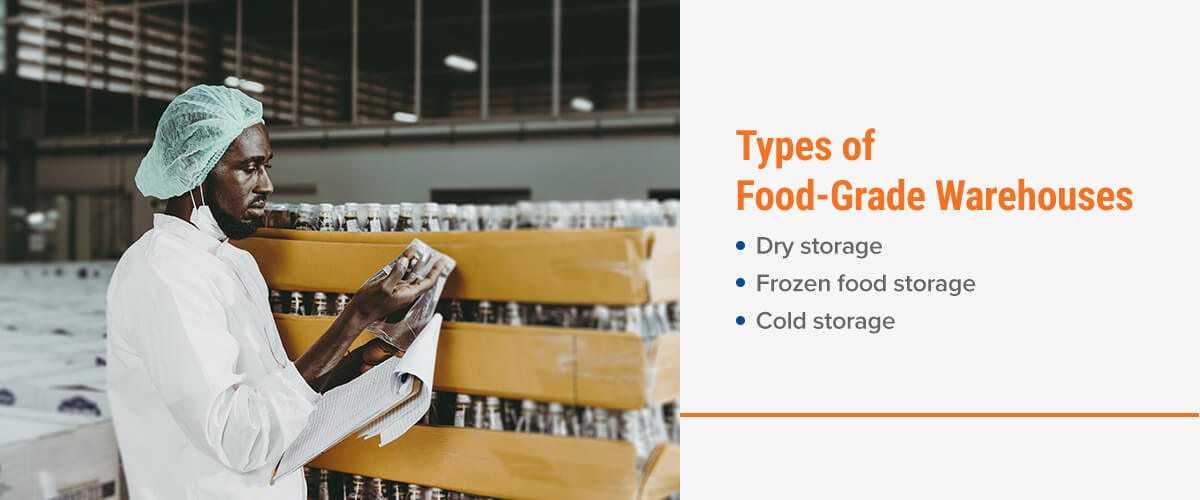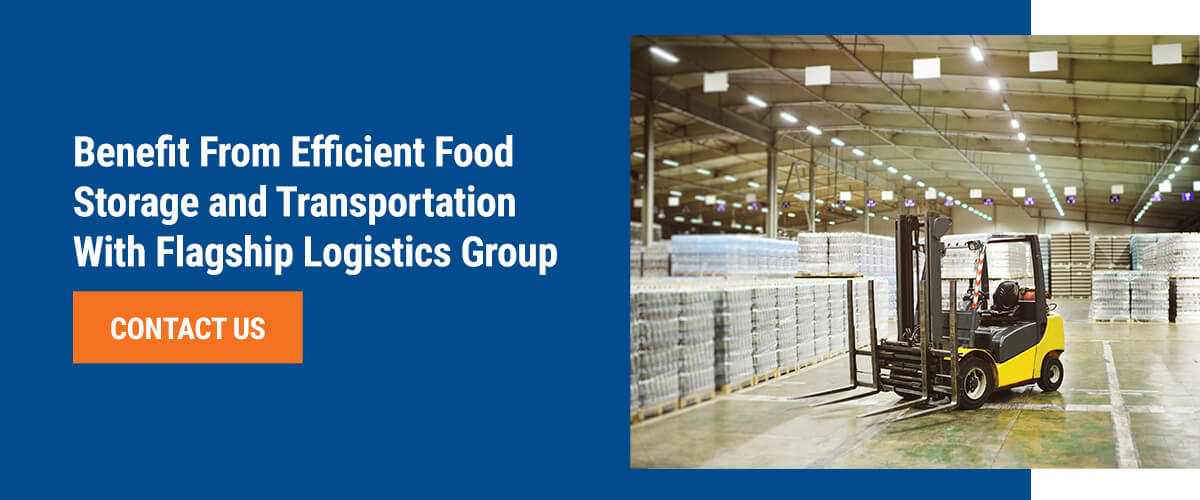
Table of Contents
1. What Is Food-Grade Warehousing?
2. Types of Food-Grade Warehouses
3. The Necessity of Food-Grade Warehousing
4. Food Safety Regulations
Food-Grade Warehousing
As companies navigate increasingly global supply chains, they frequently require safe and effective warehousing solutions for storing food products. Unlike non-perishable consumer goods, food products demand particular storage and handling processes that maximize safety and transparency while minimizing contamination and waste.
From the time when food products leave a production line to when they reach distributors, manufacturers must ensure they store and handle their products properly. A food-grade warehouse is an essential stop along a food manufacturer’s supply chain. These facilities are equipped to meet industry regulations for food storage and provide the correct type of storage for various products.
Explore Our State-Of-The-Art Warehousing Facilities
What Is Food-Grade Warehousing?
Food-grade warehousing is a type of warehousing facility that provides storage that meets food safety regulations. These warehouses are equipped with materials, equipment and facilities to safely store food for further transportation and consumption. Food-grade warehouses undergo continual evaluation to ensure they meet requirements and can stay in operation.
The phrase “food-grade” refers to any supplies or equipment that’s safe for use in preparing, producing or storing food products. Food-grade warehouses must maintain strict sanitation and cleanliness standards to protect inventory and comply with stringent local and federal regulations.

Types of Food-Grade Warehouses
Several types of food-grade warehouses provide storage solutions for food products. Here are the most common types of food-grade warehouses:
- Dry storage: Some products, like canned foods and grains, only require a dry environment to remain fresh and don’t have any temperature requirements. Food-grade warehouses that provide dry storage meet this need.
- Frozen food storage: Frozen food storage is for perishable food products that must remain frozen. Examples include frozen produce and frozen meals.
- Cold storage: Food that must remain at low temperatures without freezing is kept in cold storage warehouses. One of the benefits of cold storage is that it prolongs the shelf life of various types of produce and animal products, saving companies from food spoilage costs.
Discover Our Warehousing Services
The Necessity of Food-Grade Warehousing
Food-grade warehouses provide vital services for food manufacturers and processors. As food products move along the supply chain, they move in and out of facilities that can potentially expose them to contamination, which could cost manufacturers for spoilage, recalls and even lawsuits.
As your company searches for solutions to its food-grade warehousing needs, it’s essential to look for a warehouse that meets the applicable regulations and provides the facilities you need for the different food categories you store. Consider some of the primary principles of effective food-grade warehousing:
Health and Sanitation
Cleanliness and health are crucial for effective food safety. Food-grade warehouses must ensure their facilities and employees meet health and sanitation standards to prevent contamination by pests, bacteria growth and fungi.
Cross-Contamination
Food-grade warehouses have to prevent cross-contamination between various kinds of foods. For example, a warehouse that handles peanuts may cross-contact the allergens with food products that are supposed to be free of nuts. Cross-contamination can also occur if product packaging absorbs odors from other products in the warehouse.
Food Safety Regulations
Food-grade warehouses must meet food safety regulations outlined by local and federal authorities to maintain operations. These regulations are in place to ensure the facilities protect the goods they store and safeguard consumers.
These warehouses must establish plans to uphold cleanliness inside and outside their facilities. Employees are trained to follow protocols that will help the facility pass safety inspections and audits. Failing to follow the applicable regulations can result in fines, temporary shutdowns or permanent closure.
Food-grade warehouses must work with multiple agencies and authorities that oversee food safety at the federal and state levels. State governments have a department of health or agriculture that works with these warehouses to ensure compliance. The following federal agencies also provide regulations and guidance regarding food safety for warehousing:
- U.S. Food and Drug Administration (FDA): The FDA oversees the safety and sanitation of food products like dairy, produce, spices, nuts and cereals. Another responsibility of the FDA is to ensure products are correctly labeled.
- Food Safety and Inspection Service (FSIS): The role of FSIS is to inspect the nation’s commercial poultry, egg and meat processing plants and other facilities engaged in handling these foods to verify that food is safe, wholesome and properly labeled. The inspection programs offered by FSIS work with states to address food handling, safety, packaging and the truthfulness of labels.
- Centers for Disease Control and Prevention (CDC): One of the CDC’s primary functions is to trace food products through the supply chain to prevent foodborne illnesses. The CDC works with various groups, including local and state health departments, to detect, prevent and stop the spread of foodborne illnesses through product traceability and other prevention measures.
Food safety regulations may vary by food category and could change as legislators enact new requirements. In general, food-grade warehouses must abide by a few key parameters, including:
- Hygiene and sanitation: Warehouses must train employees on proper hygiene and sanitation procedures and regularly sanitize their equipment and facilities. Employees must use best practices to prevent cross-contamination, bacteria growth and the spread of foodborne illnesses to maintain proper food safety grades.
- Pest control: Food-grade warehouses must keep their facilities free of pests, both indoors and outdoors. Preventing pests might require a facility to fill cracks in the building’s foundation, walls or roof. Warehouses must also inspect for rodent tracks, insect burrows or bird nests or around the perimeter, and use traps or substances to eliminate the pests.
- Temperature process controls: Utilizing temperature process controls is critical in warehouses handling food products that require precise storage temperatures. Warehouse managers must ensure products remain at the correct temperature ranges to prevent spoilage or bacteria growth.
- Traceability: Another essential aspect of food safety at these warehouses is lot traceability. Food-grade warehouses must be able to trace product lots and dates to ensure products move into and out of the warehouse at the appropriate intervals.
Benefit From Efficient Food Storage and Transportation With Flagship Logistics Group
Food-grade warehouses must meet strict regulations to ensure products are handled safely. Because of these stringent and complex regulations, many companies outsource this step in their supply chains. Outsourcing food-grade warehousing to a third-party logistics provider with experience and dependable performance gives your company peace of mind about its food warehousing solution.
With more than 30 years of experience, Flagship Logistics Group is an industry-leading logistics provider you can trust to store and transport your food products safely. Our goal is to work in your best interest and provide transparent services tailored to your business’s needs.
We offer multi-temperature food-grade warehousing that removes the need for you to source multiple warehouse management solutions. We also provide temperature-controlled TL and LTL transportation to safely deliver your shipments on schedule.
Flagship Logistics Group is dedicated to providing your company in the food industry with the highest quality supply chain and logistics services. To learn more about our services, contact us today.
